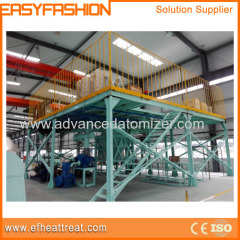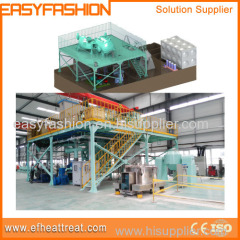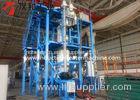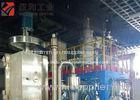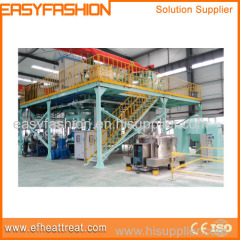
Metal Powder Atomization Equipment
| Min. Order: | 1 Set/Sets |
|---|---|
| Trade Term: | EXW |
| Payment Terms: | T/T |
| Place of Origin: | Hunan |
Company Profile
| Location: | China (Mainland) |
|---|---|
| Business Type: | Manufacturer, Trading Company |
Product Detail
| Model No.: | EF-WAPME |
|---|---|
| Means of Transport: | Ocean |
| Output: | 10-500KG |
| Voltage: | 380V |
| Supply Power: | Three Phase, 380V, 50Hz |
| Certification: | CE/CB/CQC/FCC/ISO |
| Max. Smelting: | 1750 |
| Tundish Heating Powder/kw: | 10-20 |
| Use: | Atomization Metal Powder |
| Packing: | wooden case |
| Delivery Date: | 90-120 working days |
Product Description
1. Introduciton
Atomized powder manufacuring method is a kind of new technology in the powder metallurgy industry which was developed in recent years. It is with the characteristics of simple craft, easy to master technology, not easy oxidizing material, and high degree of automation. Specific process is that alloy (metal) melts and refines in induction furnace, and molten metal is poured into a heat preservation crucible, and enters diversion pipe and nozzle, then the melt flow is atomized by high pressure liquid flow (or airflow), and atomized metal powder solidifies and subsides in atomizing tower, finally falling into powder collect cans to separate. It is widely used in non-ferrous metal powder manufacturing area like, atomized iron powder, copper powder, aluminum powder, stainless steel powder, alloy powder, etc. Manufacturing technology of complete set of iron powder equipment, copper powder equipment, silver powder equipment, alloy powder equipment is more and more mature gradually.
2. Application and Principle
High pressure water atomization powder equipment, a kind of industrial mass production device, is designed to meet the requirement of water atomization powder manufacturing craft under the atmosphere condition. Working principle of high pressure water atomization powder manufacturing equipment is that melting metal or metal alloy under gas condition, metal liquid during the process of passing heat preservation tundish and diversion pipe under the condition of gas protection is atomized and crushed into a large number of tiny metal droplet by ultra-high pressure waterflow through nozzle. The flying tiny metal droplet is formed into spherical or irregular particles under the combination action of surface tension and rapid cooling of water to achieve the goal of powder production.
3. Features of Water Atomization Powder Process
1. It can be used to manufacture most of metal powder and its alloy powder with low production cost.
2. It can be used to manufacture spherical or irregular powder.
3. Because of rapid solidification without segregation phenomenon, many special alloy powder can be produced.
4. Using right craft can make the powder particle size to achieve a required range.
4. Main Technical Parameters
| Model | JTSWH-30 | JTSWH-50 | JTSWH-100 | JTSWH-300 | JTSWH-500 | JTSWH-1000 |
| Pressure of High Pressure Water(Mpa) | 100-300 | |||||
| Flow of High Pressure Water(L/min) | 50-800 | |||||
| Furnace Charging Weight(Kg) | 30 | 50 | 100 | 300 | 500 | 1000 |
| Max. Smelting Temperature(°C) | 1750 | |||||
| Smelting Heating Power(KW) | 50 | 80 | 130 | 200 | 260 | 400 |
| Temperature Measuring Method | Infrared, WRe5.26 | |||||
| Tundish Heating Power(KW) | 10-20 | |||||
| Supply Power | Three Phase, 380V, 50Hz | |||||
| Total Installed Powder(KW) | To be determined | |||||
| Flow of Cooling Power (L/min) | 150 | 300 | 400 | 700 | ||
| Cooling Water Device | Air cooling tower, water cooling unit, heat exchanger | |||||
| Flow of Soft Water(m3/h) | 6-20 | |||||
| Control Method | Relay or PLC | |||||
| Operating Interface | Button type or touch screen | |||||
| Data Record | 12 data curve record, LCD monitor and display | |||||
| Overall Dimension(LxWxH)mm | 7500x4000x6500 | 7500x4200x6500 | 8200x4200x6500 | 8200x4500x6500 | 8500x4500x6500 | 9200x5000x6500 |
5. Structure
High pressure water atomization powder manufactuing equipment is consisted of the following parts:
Melting and tundish system, atomizing system, inert gas protection system, ultra-high pressure water system, powder collect dewatering and drying system, screening system, cooling water system, PLC control system, platform system, and so on.
1. Melting and tundish system
2. Atomizing system
3. Inert gas protection system
4. Ultra-high pressure water system
5. Cooling system
6. Control system
(1) Melting and tundish system
Actually it is a medium frequency induction melting furnace, which consists of shell, induction coil, temperature measuring equipment, tilting furnace device, etc. The shell is a frame structure, which is made of carbon steel and stainless steel. Induction loop is installed in the middle, and the crucible is placed in the induction coil and could do the melting and pouring. The tundish is installed in nozzle system for storing molten liquid metal and thermal insulation.
It is smaller than the melting crucible volume. The tundish holding furnace has its own heating system and temperature measuring system. The heating system of holding furnace has two ways of electric resistance heating and induction heating, and generally resistance heating temperature can reach 1000 °C and induction heating temperature can reach 1200 °C or higher, but be reasonable choice of crucible materials.
(2) Atomizing system
The atomization system is made up of nozzle, high pressure water pipe, valve, etc.
(3) Inert gas protection system
During the process of making powder, to reduce the oxidation of metals and alloys and to reduce the oxygen content of powder, we commonly spray a quantitative inert gas into the tower for atmosphere protection.
(4) Ultra-high pressure water system
The system is to provide high-pressure water for atomizing nozzle, and it is consisted of high pressure water pumps, water tanks, valves, high pressure hoses, busbar, etc.
(5) Cooling system
The complete device is equipped with water cooling system, which is essential. Cooling water temperature will be reflected on a second instrument in order to guarantee the security of device running.
(6) Control system
Control system is the operation control center of the equipment. All the operations and related data are transmitted to PLC of the system, and the results are displayed through the processing and preservation.


